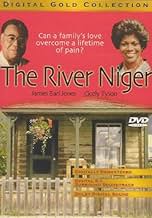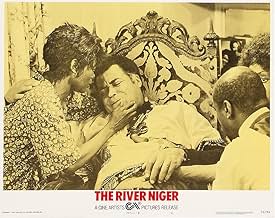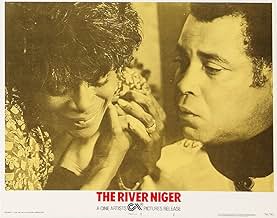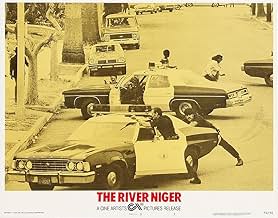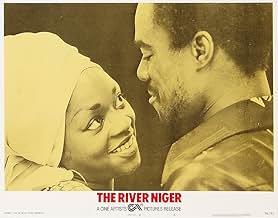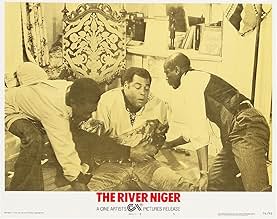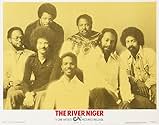Una mirada íntima a la vida en el gueto: Johnny Williams es pintor de casas.Una mirada íntima a la vida en el gueto: Johnny Williams es pintor de casas.Una mirada íntima a la vida en el gueto: Johnny Williams es pintor de casas.
- Premios
- 1 premio ganado en total
Louis Gossett Jr.
- Dr. Dudley Stanton
- (as Lou Gossett)
Opiniones destacadas
"The River Niger" is very much a time capsule of the mid-1970s. There's a lot of good acting, some bad acting, and some pretty much middle of the road direction. The director, Krishna Shah, is probably the main thing which keeps this good film from being great. He just doesn't have a real vision for this sort of thing. As you might expect from a stage adaptation, Joseph A. Walker's script is why this is worth watching. He writes excellent dialogue, characters, and best of all - poetry. Then again, there's a bit too much emphasis on the self-conscious black identity stuff, even for 1976.
James Earl Jones, who plays the poet, is the best thing about "The River Niger". He is very compelling, intense, and instantly likable. His performance, along with that of Louis Gossett Jr. (credited here as Lou Gossett), makes one wish there was a better made film to frame it. Definitely worth seeing, though.
James Earl Jones, who plays the poet, is the best thing about "The River Niger". He is very compelling, intense, and instantly likable. His performance, along with that of Louis Gossett Jr. (credited here as Lou Gossett), makes one wish there was a better made film to frame it. Definitely worth seeing, though.
There are several things to understand about this movie. 1. The actors and actresses are African American and at the time of the movie were not necessarily appreciated for their outstanding talents that have been showcased in later years. 2. Comments that the "gang" members were hokey perhaps come from those who have never been residents in the Watts area of LA, the south side of Chicago or the east side of Detroit in the early 1970's. (3) I find that the use of the"n" word brings about discussion with today's students of communication and film who are products of the rap culture's influences. All in all the film's adaptation from the original play is a good one.
This film was a definite "okay". It didn't have the impact that many films would have with such a topic. But, the general idea was there and that's what was so important. The vast difference between James Earl Jones being a drunk bum, to a philosophical poet speaking of something as beautiful as the Niger River. He was brilliant of course. Not as well as "Finder's Fee", but that really can't be beat. Big nods to the other actors and writers trying their hardest to make a serious film during the famous black exploitation era. You have to appreciate that aspect of the film. Krishan Shan does deserve credit but, not fantastic.........................................the end
You don't have to be black to fully appreciate this film but..... What am I saying, of course you do! This film may be based on an award winning off Broadway hit play, but that does not prevent it from being a dated piece of boring black angst. James Earl Jones, Lou Gossett & Cicely Tyson give very credible performances, but the actors playing the younger roles were so hokey, the overall film becomes unwatchable. The young actress made up to be the grandmother was particularly inept. As much as I admire James Earl Jones, I must admit that I could not sit through the whole thing, so I do not know how it ends.
This movie starred some heavy-hitter actors, Black or otherwise: James Earl Jones, Cicely Tyson, Louis Gossett Jr., Glynn Turman, and a couple of other familiar faces. There is a lot going on in the movie without there being a clear direction toward any one thing.
Johnny Williams (James Earl Jones) was a hopeless alcoholic whose sole source of pride was his military son, Jeff (Glynn Turman).
Jeff was like many young Black men in the 70's, he wanted more than what the world was willing to give him, but most of all he wanted to be his own man.
The movie had some erudite moments from both Johnny and Jeff, but at other times it seems to wander hoping to survive on poignant rhetoric. Unfortunately, I was watching a bad dub because the sound would drag and the picture quality was bad even for 1975--and this was an Amazon Prime video!
But, I'd never hold video or sound quality against a low budget drama. The overall product wasn't that great, but it had its moments and considering the budget was probably barely enough to cover bus fare to and from shoots, I'll give it a pass.
Johnny Williams (James Earl Jones) was a hopeless alcoholic whose sole source of pride was his military son, Jeff (Glynn Turman).
Jeff was like many young Black men in the 70's, he wanted more than what the world was willing to give him, but most of all he wanted to be his own man.
The movie had some erudite moments from both Johnny and Jeff, but at other times it seems to wander hoping to survive on poignant rhetoric. Unfortunately, I was watching a bad dub because the sound would drag and the picture quality was bad even for 1975--and this was an Amazon Prime video!
But, I'd never hold video or sound quality against a low budget drama. The overall product wasn't that great, but it had its moments and considering the budget was probably barely enough to cover bus fare to and from shoots, I'll give it a pass.
¿Sabías que…?
- TriviaJames Earl Jones and Cicely Tyson worked together again on Broadway in The Gin Game from 2015 to 2016.
- ConexionesReferenced in Call Me Angel, Sir (1976)
Selecciones populares
Inicia sesión para calificar y agrega a la lista de videos para obtener recomendaciones personalizadas
Detalles
- Fecha de lanzamiento
- País de origen
- Idioma
- También se conoce como
- Der schwarze Fluß
- Locaciones de filmación
- Productoras
- Ver más créditos de la compañía en IMDbPro
Contribuir a esta página
Sugiere una edición o agrega el contenido que falta

Principales brechas de datos
By what name was The River Niger (1976) officially released in India in English?
Responda

